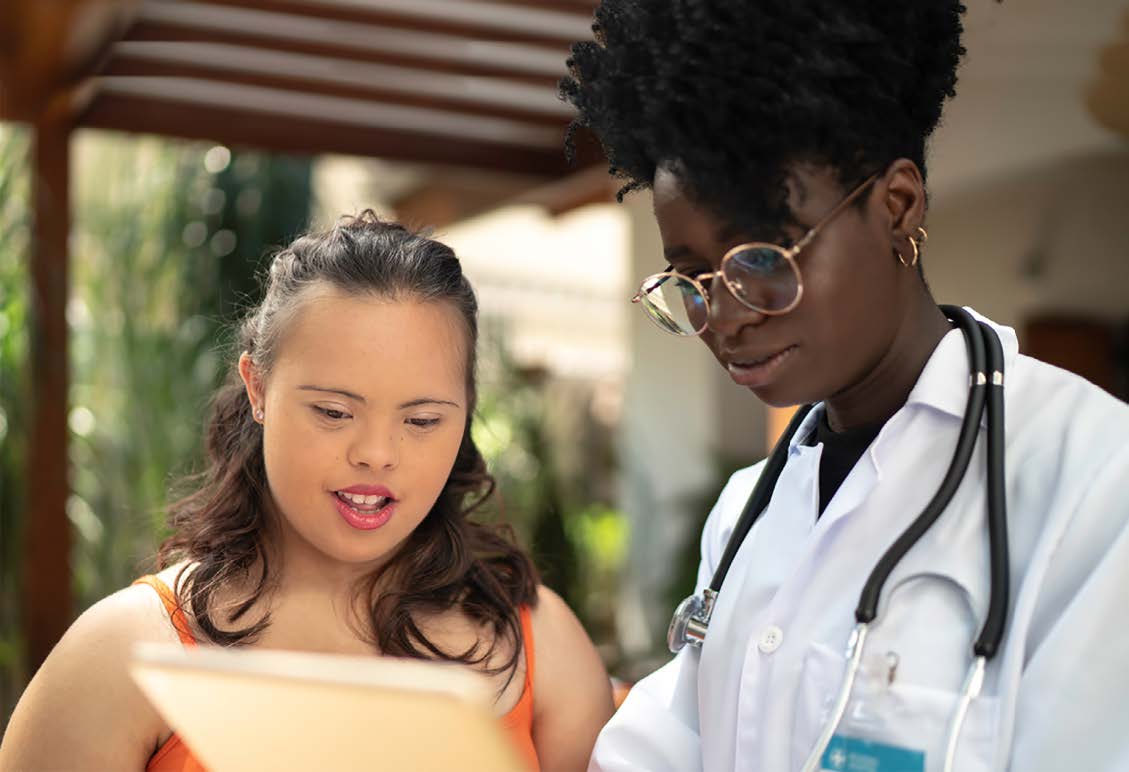Information in the Question and Answer document is presented to help you care for your loved one with Down syndrome during the Coronavirus Disease 2019 (COVID-19) pandemic. Please share this information freely.
Q&A on COVID-19 AND DOWN SYNDROME
The unprecedented spread of the COVID-19 coronavirus is presenting the world with a unique challenge and, in our case, calls for a united response to better understand its impact upon persons with Down syndrome. Several organizations that are part of the greater Down syndrome community have come together to assemble important information that can provide some answers to the many questions that families may have. This is a time to unite and fight the virus and the fear that surrounds it. It is our hope that this information will help us get through this health challenge.
Please use this information to help you with supporting your loved one and share the information in this document with your family, friends, and others within the Down syndrome community. Also, as you seek information on the Internet, if you read or hear something that sounds odd or if you are not sure of the source, please check in with one of the organizations listed on this Q & A. We will try to get you reliable information.
In this Q & A, we have tried to anticipate the questions you may have and provide answers about preventing the spread of the virus, the common symptoms to look for, and things to consider when making decisions on behalf of or with your loved one with Down syndrome. We also have included links to trusted sources of information, such as the CDC; see cdc.gov/coronavirus/2019-nCoV/index.html.
Critically important is that you should know how to protect yourself and your loved one from being infected. The CDC tells us that frequent hand washing and social distancing remain the best ways to protect yourself and your family from the COVID-19 coronavirus. The prominent symptoms of the virus are fever, cough, shortness of breath, or difficulty breathing. The symptoms may appear 2-14 days after exposure to the virus, which means that anyone can pass along the virus before they self-recognize that they have symptoms.
Medically-related questions that are specific to your loved one with Down syndrome are best answered by a trusted healthcare professional who knows him or her. However, if you suspect your loved one may be infected, please call the healthcare professional first. Going to an office or a hospital without first call ing may increase your or your loved one's risk of exposure to the virus.

ANSWERING THE CALL: Contributors to the Q&A have tried to answer questions that are important, including what is unique about the virus in people with Down syndrome, how to help prevent the spread of the virus, what are its common symptoms, and what to think about when making decisions.
Access the Q&A document at: the-ntg.org/covid-19-qanda
These are unprecedented times and we need to come together to fight both the virus and the misinformation around it that may lead to fear. Please join us in this fight to practice recommended prevention strategies and to share only accurate information. As a caregiver you must also take care of yourself. You can't care for anyone if you are sick or too tired. Stay healthy for the sake of those who depend on you. Also, as we are a community, check in with your friends and other family members who may be struggling with this health emergency. Give them a call or a text and make sure that they have the supplies that they need to get through the coming days and weeks. Share supplies and your love with the Down syndrome community. Most of all, keep up your spirit and keep in touch with those who care about you and your loved one.
This Q&A has been assembled by the collective input of many organizations and experts who have contributed their best to make it authoritative and informative. That said, not everything is known at this stage about the coronavirus COVID-19 and how it affects persons with Down syndrome, but as we learn more, we will continue to update this Q&A.
CONTRIBUTORS:
CONTRIBUTORS: Appreciation is extended to the following persons who contributed their time and expertise to the creation of this Q&A: Nicole Baumer MD, Thomas Buckley EdD, Brian Chicoine MD, Lawrence Force, PhD., Paula Gann, Elizabeth Head PhD, Jim Henricks, PhD, Hampus Hillerstrom, Mary Hogan MAT, Matthew Janicki, PhD, Nancy Jokinen, PhD, Seth Keller MD, Florence Lai MD, Ronald Lucchino, PhD, Benjamin Margolis, MD, Philip McCallion PhD, Andrew Novak, MD, Kathryn Pears MPPM, Stephen Perlman DDS, Mary Pinan MD, Rick Rader MD, Dennis Rosen MD, Kathryn Service NP, Stephanie Sherman PhD, Brian Slotko MD, Dawna Mughal Torres PhD, Amy Van Bergen, Alan Wong DDS
CONTRIBUTING NATIONAL ORGANIZATIONS:
This Q&A was developed jointly by several national organizations, including the Down Syndrome Medical Interest Group (DS-MIG), Global Down Syndrome Foundation, Lumind Research Down Syndrome Foundation, National Down Syndrome Society (NDSS), and the National Task Group on Intellectual Disabilities and Dementia Practices (NTG) and EP Magazine. It is offered in the public domain and others are encouraged to set up links to it from their websites. The document will be updated as new and additional information is presented. It is hosted on the website of the National Down Syndrome Society (NDSS) and all interested Down syndrome organizations can link to the Q&A webpage. We are very thankful for the input received from the many experts who contributed and reviewed the Q&A. We acknowledge the contribution of the lead author, Dr. Matthew P. Janicki, PhD., co-chair of the US National Task Group on Intellectual Disabilities and Dementia Practices. •